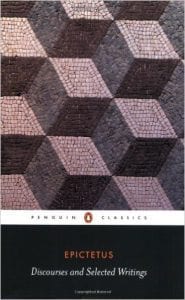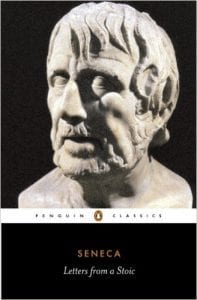The starting point of any new pursuit is critical. Stoicism is no difference. Picking up the wrong book can derail even the most interested student. So where should someone start with Stoicism? We decided to put together a short list with three books that will help you both understand Stoicism but also teach you valuable lessons for life.
If this is the first time you are coming across this philosophy, you might be worried this would be dry and academic and you’d need to spend countless hours to untangle sentences. This is nothing like that—in fact, it’s the furthest from it. These are some of the most readable, relatable and powerful works from human history. No other philosophic writing is more accessible. They feel as if they were written two weeks ago, not two millennia ago. We promise, they’ll change you for the better.
Let’s get started!
Meditations by Marcus Aurelius 
Meditations is perhaps the only document of its kind ever made. It is the private thoughts of the world’s most powerful man giving advice to himself on how to make good on the responsibilities and obligations of his positions. Trained in stoic philosophy, Marcus stopped almost every night to practice a series of spiritual exercises—reminders designed to make him humble, patient, empathetic, generous, and strong in the face of whatever he was dealing with. Well, now we have this book. It is imminently readable and perfectly accessible. You cannot read this book and not come away with a phrase or a line that will be helpful to you next time you are in trouble. Read it, it is practical philosophy embodied. Make sure you pick up the Gregory Hays translation from Modern Library. It is the most accessible edition—completely devoid of any “thou’s” and “shalls”.
“The mind adapts and converts to its own purposes the obstacle to our acting. The impediment to action advances action. What stands in the way becomes the way.”
Discourses and Selected Writings by Epictetus 
Of the big three (Seneca, Marcus Aurelius, Epictetus), Epictetus is the most preachy and for many, the least fun to read. That doesn’t mean he isn’t brilliant. On many occasions he expresses something so clearly and profoundly that it will shake you to your core. Personally, I prefer the Penguin translations, but I’ve tried a handful of others and found the differences to be relatively negligible.
“To make the best of what is in our power, and take the rest as it occurs.”
Letters from a Stoic by Seneca 
Seneca, like Marcus, was also a powerful man in Rome. He was also a great writer and from the looks of it, a trusted friend who gave great advice to his friends. Much of that advice survives in the form of letters. Now we can read those letters and they can guide us through problems with grief, wealth, poverty, success, failure, education and so many other things. Seneca was a stoic as well, but like Marcus, he was practical and borrowed liberally from other schools. As he quipped to a friend, “I don’t care about the author if the line is good.” That is the ethos of practical philosophy—it doesn’t matter from whom or when it came from, what matters if it helps you in your life, if only for a second. Reading Seneca will do that. The Penguin translation is fantastic, both for this collection of letters (which are more like essays than true correspondence) and for his collection of essays, On the Shortness of Life.
“If you really want to escape the things that harass you, what you’re needing is not to be in a different place but to be a different person.”
P.S. For more recommendations (books, blogs, articles), sign up for the Daily Stoic free 7-day series. It is packed with resources on Stoicism—from more book recommendations to Stoic exercises—as well as a chapter from bestselling author Ryan Holiday’s book, The Obstacle Is The Way.
RELATED:
28 Books On Stoicism: The (Hopefully) Ultimate Reading List
Explore Our Daily Stoic Store